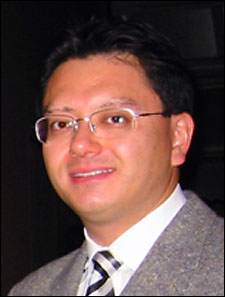Hensch named professor of molecular and cellular biology

Neuroscientist Takao Hensch, whose pathbreaking work examines how sensory experience shapes brain circuitry during critical periods of early development, will join Harvard University’s Faculty of Arts and Sciences as professor of molecular and cellular biology, starting in the 2006-07 academic year.
Hensch, 39, will also be an affiliate of Harvard’s interdisciplinary Center for Brain Science and will hold a joint appointment as professor of neurology at Children’s Hospital Boston and Harvard Medical School.
Hensch comes to Harvard from the RIKEN Brain Science Institute in Saitama, Japan, where he has served since 1996 as a laboratory head and group director in the areas of neuronal circuit development, human learning, and critical period mechanisms research. He hopes to promote intercultural exchange for Harvard students through internships and collaborations in Japan, such as the RIKEN Summer Program that he helped to create.
“Professor Hensch is a superb scientist who has focused powerful methods and innovative thinking on the fundamental question of how the developing brain is shaped by experience,” said William C. Kirby, Edith and Benjamin Geisinger Professor of History and dean of the Faculty of Arts and Sciences. “His research is characterized by great rigor, sophistication, and clarity of thought, making him a world leader among systems neuroscientists. His skills as an effective and sympathetic teacher will give our students new insights into the important and fast-moving field of neuroscience.”
With interests ranging from child development and human disease to brain circuitry, Hensch is best known for his studies of the interplay of sensory input and genetics early in mammalian brain development, when the unusual malleability of the nervous system allows experiences to shape the lifelong wiring of the brain. His research has employed techniques from systems and molecular neuroscience to probe the mechanisms of early neural wiring, the limits of early brain plasticity, and how such plasticity might be restored later in life. Such work could have profound implications for developmental disorders as well as learning and education.
Hensch’s group made the surprising finding that the maturation of inhibitory circuits – such as the stunted development of wiring in visual cortex from an eye deprived of vision – controls the timing of early brain plasticity. By directly manipulating the onset of such inhibitory transmission within the brain, Hensch and his colleagues have shown that neural plasticity mirrors this timing, a finding that has had a major impact on developmental neuroscience. Hensch continues to investigate the structural and molecular mechanisms of these phenomena, as well as the role of rhythmic electrical activity that occurs in the brain during sleep, visual experience, and brain plasticity.
Born in Tokyo and raised in New York, Hensch received an A.B. in biological sciences from Harvard in 1988, an M.S. in public health from the University of Tokyo in 1991, and a Ph.D. in neuroscience from the University of California, San Francisco, in 1996. He has received honors including the Young Investigator Award from both the Japanese (2001 Tsukahara Prize) and U.S. Society for Neuroscience (2005), a Howard Hughes Medical Institute Fellowship (1992-1996), a Fulbright fellowship (1990-1991), and Harvard College’s Thomas T. Hoopes Prize for outstanding original thesis research (1988). Hensch has served as associate editor of the Journal of Neuroscience, Neuron, and NeuroSignals.




